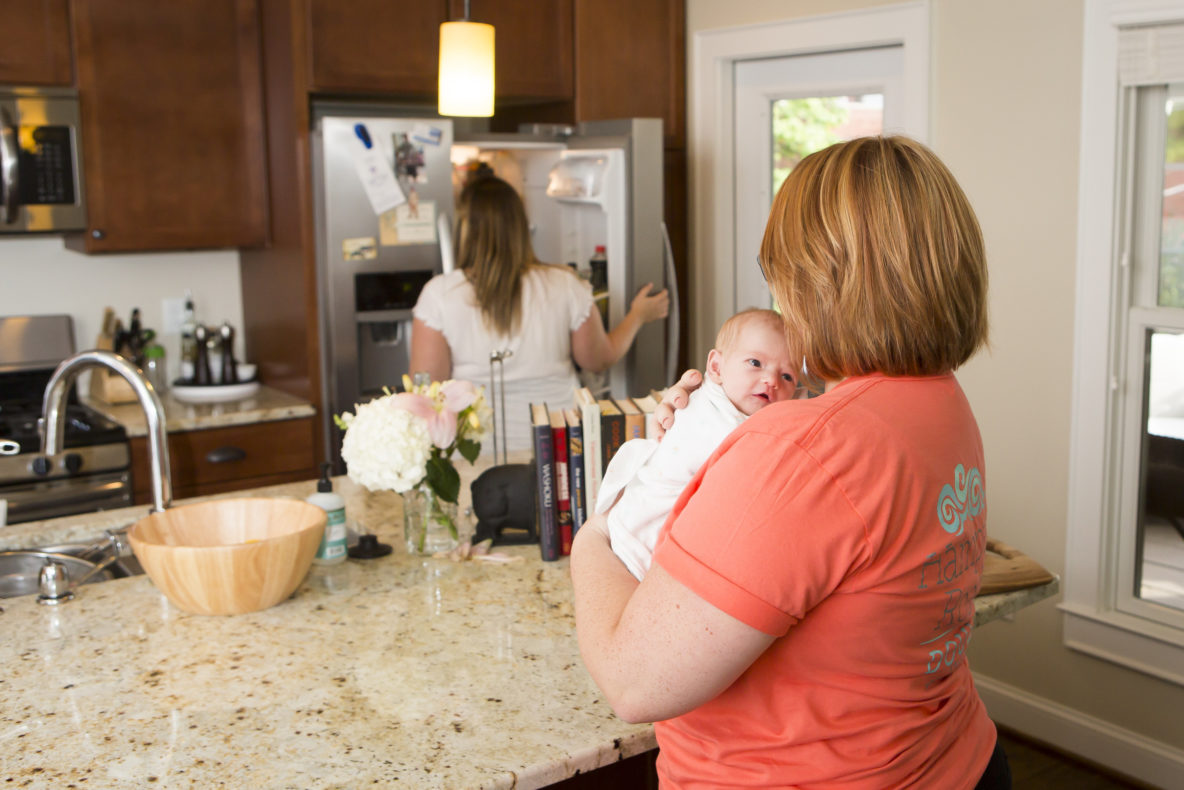We are honored to have guest blogger, Katie Hughes, LCSW, talking about surviving the first year postpartum. Her expertise in supporting families during pregnancy & parenthood and personal experience in her own parenting journey helps us better understand how to navigate this time in a healthy way.
My daughter’s first birthday party was as much a celebration of her life as it was a time to relish in the fact that I survived my first year of motherhood. Although my pregnancy was not exactly stress-free, it was relatively easy compared to the postpartum period. I remember holding this little person and being both in awe of and terrified by the intensity of emotions I felt for her. Despite having a large supportive family, I often felt alone during those first 12 months especially during the 12am, 2am, 3am, and 5am wakeups. Then there’s the conflicting advice everyone throws at you (and that I incessantly sought out on my own thanks to the internet). In those first weeks, just deciding which swaddle blanket to use started to feel like a life or death decision that would determine whether I slept or was awake with the baby all night!
As I reflect on my first year postpartum, I am in awe of the help and support I experienced from other women – many of whom were strangers or acquaintances at best. A home visit to help me figure out my breast pump, a donation of breastmilk when I was struggling with supply, a friend who stayed at my house to help as I recovered from illness. The support was there, I just needed to accept it. Receiving this support and knowing I didn’t need to tough it out alone were an integral part of surviving that first year.
As a therapist, I have been witness to the pain and fear of new mothers. I hear countless women wrestle with feelings of guilt as they reflect on their own struggles and begin to openly explore difficult emotions. Emotions that we are generally told we “shouldn’t” feel. “Am I a good mom if I miss my old life?” “Am I a good mom if I’m struggling to feel attached to my baby? “Am I a good mom if I feel depressed and cry while holding my baby?” “Am I a good mom if I don’t want to breastfeed?” It’s easy to feel alone in those first days, weeks, and even months of motherhood. We don’t want to admit that we’re struggling; therefore, we all feel as if we’re struggling alone. You do not have to be alone. Needing support is not a sign of weakness.
So what do we do? How do we prepare ourselves to renegotiate our lives postpartum? How do we balance the demands on us while living in a society that expects us to bounce back to our pre-baby lives after 6 weeks, 4 weeks, and for some 2 weeks?
Be aware of your personal risk factors.
There are many factors (biological, psychological, and social) that can make someone more vulnerable during the postpartum period. A few may include: a family history or personal history of depression or anxiety; stressors in other areas of one’s life; a difficult pregnancy and/or delivery; struggles with breastfeeding; a lack of social support; previous history of loss; conflict with a partner. These factors do not mean you are destined to struggle during your postpartum period. However, it can be helpful to be aware of them and plan for how you might mitigate these risks. It might even be beneficial to connect with a therapist prior to the birth to get support and begin discussing ways to increase protective factors for after birth.
Increase your social support.
Identify safe people in your life and ask them if you can use them for support during the postpartum period. Let them know what would be helpful (i.e. a meal, just being there to listen, helping around the house, taking the baby for an hour). You might also consider hiring a postpartum doula or attending a local support group. Being around others who are going through a similar transition can help immensely to feel less alone. If you are continuing to struggle after using your support (or do not have adequate support) you may want to work with a trusted therapist and/or explore the option of medication with your doctor.
Make time for self-care.
The first year after giving birth to my daughter, a friend of mine came to my house once a week to drag me out for a walk. As much as I hated it in the moment, I knew it was necessary for my overall wellbeing. You cannot take care of others if you aren’t taking care of yourself. Sleep, good nutrition, and exercise are a good place to start to ensure you are maintaining adequate self-care. I know – this might sound impossible with a small baby. Consider setting up small goals related to self-care to help it feel more manageable. For example, if a full night’s sleep is not possible consider ways you can maximize uninterrupted sleep to even 4 hours with the assistance of a partner or another helper. If resuming your pre-baby work out is not possible right now, try taking a 15 minute walk in the morning or evening.
Make room for your feelings.
A few months ago my daughter woke up screaming. After comforting her, I stumbled back into bed and heard her begin to cry out again. I thought to myself “I really hate this part of motherhood. I love my daughter and I hate waking up in the middle of the night”. This experience struck me. It was one of the first times that I was able to embrace all my conflicting emotions without reverting to a state of mom guilt. There was room for all of these things to exist and it didn’t mean I was a bad mom.
You will likely feel a multitude of emotions during this first year. You might miss your pre-baby life. You might feel scared of whether or not you are going to be a “good” mom. You might feel sad if this birth brings up past feelings of loss. Recognize what you are feeling without the additional judgement of whether it is good or bad. Remember your feelings are just that – feelings!
Most importantly remember that you do not have to do this alone. Being a parent is hard work and needing help is not a sign weakness or failure.
 Katie Hughes, LCSW, is a psychotherapist serving the Hampton Roads community. She has a passion for working with individuals and couples as they navigate the adventure of parenthood. For more information about her practice, visit her website at www.katiehughestherapy.com
Katie Hughes, LCSW, is a psychotherapist serving the Hampton Roads community. She has a passion for working with individuals and couples as they navigate the adventure of parenthood. For more information about her practice, visit her website at www.katiehughestherapy.com
